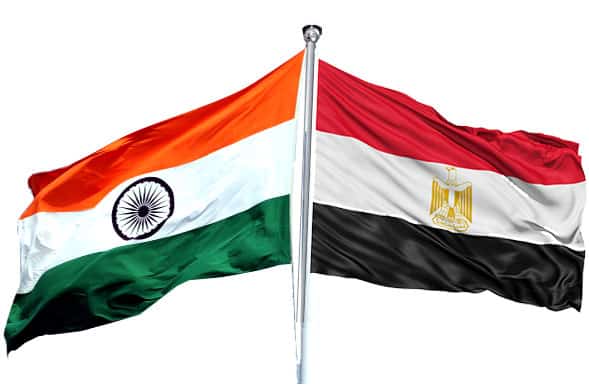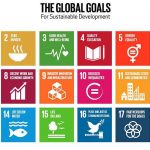A brief historical background of relations
- For their respective independence movements Saad Zaghloul and Mahatma Gandhi had contacts on the common goals.
- India and Egypt became the founders of the Non-Aligned Movement in 1955 under Jawaharlal Nehru and Gamal Abdel Nasser respectively.
- India and Egypt are considered as one of the oldest human-civilizations and therefore people of either country have warm feelings of friendship and affection towards each other.
- In 1967, following the Arab-Israeli war, India supported Egypt and the Arabs.
India-Egypt Relations
- India seeks Egypt as an important bridge that connects Asia and Africa.
- Egypt has traditionally been one of India’s most important trading partners in the African continent.
- Three streets in Cairo are named after Indian leaders namely, Mahatma Gandhi, Pandit Nehru and Dr. Zakir Hussein.
- Pan Africa e-Network is an Indian government initiative to strengthen its bond with Africa. Till December 2014, 45 Egyptian students got MBA, 45 students got Masters IT degree, 28 students got Diploma in Business Administration and 15 students got IT diplomas from three prestigious Indian Universities.
- Egypt seeks India as a country which can help stabilize its economy and also provide ground level development for fighting terrorism and internal conflicts.
- Technical cooperation and assistance has been a major part of the bilateral relationship. In 2014-15, 124 Egyptians have been selected to undergo various training programmes in India.
- Both countries have also signed various treaties and MoUs in the field of scientific cooperation and technological development.
- Economic and Commercial Relations; Development Cooperation
- India is the sixth largest trading partner of Egypt – the second largest export destination and tenth largest import source for Egypt.
- India’s imports from Egypt were worth US$ 1.74 billion and exports have been recorded to US$ 3.02 billion during FY 2014-15.
- The top five Indian exports during FY 2014-15 were mineral fuels, meat, vehicles and parts, cotton yarn and organic chemicals. While the top five Indian imports were crude petroleum, rock phosphate, inorganic chemicals, cotton and fruits.
- At present India has around US$ 3 billion investments in Egypt with around 50 Indian companies operating in the country and approximately half are joint ventures and wholly owned Indian subsidiaries.
- The rest of the Indian companies operate in Egypt through their representative offices and execute various projects for Governmental organizations.
- Major Indian investments in Egypt include TCI Sanmar, Alexandria Carbon Black, Alexandria Fibre Co. Dabur India, Niletex, Egypt-India Polyester Company (EIPET) and SCIB Paints.
- Overall, these companies provide direct and indirect employment to approximately 35,000 Egyptians. The top five Indian companies alone, mainly in the labour intensive textile industry, provide direct employment to more than 12,800 Egyptians.
Energy Security
- Egypt remains as one of the main exporters of oil and crude to India.
- In 2003, Indian giant Reliance signed a contract with the Egyptian General Petroleum Corporation (EGPC) to import 8 shipments of crude oil in 2003. Two years preceding the contract, they had imported shipments from Egypt.
- In August 2004, the Indian company GAIL procured 15% of the Egyptian Company Nat Gas which deals with marketing and distributing natural gas in Egypt.
- In 2008, India’s KEC International Limited, received its largest order worth ₹636 crore (US$95 million) from Egyptian Electricity Transmission Company. It was completed on a turnkey basis within a period 24 months.
Security Concerns
- Both countries seek each other as important in establishing peace and stability in their region.
- The two leaders highlighted the leading role of India and Egypt in the maintenance of international peace and security, being among the ten largest troop and police contributing countries in United Nations missions.
- The increasing dominance of IS in Syria and Middle-Eastern countries is now laying its root in Egypt also which is a great threat to Egyptian denizens.
- Latest developments in West Asia and North Africa region, the spread of extremism and radicalization and the scourge of terrorism are the gravest threat to international security and peace.
- There is an urgent need for cessation of hostilities in Syria and expressed concern over humanitarian crisis in the country and India-Egypt share a common ideology on the issue.
- India-Egypt support the people and government of Iraq in their efforts to overcome the existing crisis to uphold Iraq’s national sovereignty and territorial integrity.
Latest Visit of Egyptian President to India on 1-3 September, 2016
- Egyptian President Abdel Fattah Al-Sisi arrived in New Delhi on a three-day visit at the invitation of the President of India.
- He attended a business event where he delivered a keynote address and invited the Indian businessmen to explore new and emerging business opportunities in Egypt.
- He met Prime Minister Modi for discussion over bilateral relations.
- Both leaders highlighted the importance of growing bilateral economic interaction in recent years and encouraged companies and corporations from their respective countries to explore emerging economic and investment opportunities in each other’s countries.
- Both leaders noted the importance of cultural exchange and agreed there should be more cultural and academic exchanges to promote closer understanding and linkages, especially among the youth.
- The two leaders agreed to expand cooperation in the field of space utilising India’s expertise in launching satellites and other advances in space technology.
- The two leaders agreed that a special and enlarged “India by the Nile Festival” would be held in 2017 to commemorate the 70th anniversary of India’s independence. They also welcomed the proposal to have the inaugural “Egypt by the Ganga Festival” in 2017.
Future trends and Conclusion
- India and Egypt enjoy strong, traditional and historical ties that have contributed to peace and development in their respective regions and beyond.
- Both countries have fought together for their independence and have seen friendship among their leaders over the time.
- Both countries also share various cultural links and tend to increase the sweet relation by many cultural exchange programs.
- Where India is emerging as global power once again having stable democracy, growth in economic development and evolving science and technology, Egypt has been fighting with its internal security and stability.
- Egypt can provide India with new development and economic opportunities and on the other hand India will play an important role to provide Egypt its lost internal stability and a much improved economic stability over the years.











